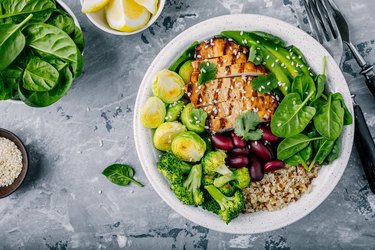
When considering what weight-loss diet to try, you may have come across the "chicken diet" or "chicken-only diet." And the claims — namely, quick and effective weight loss — may make the poultry-packed plan appealing.
Here, we'll take a look at where this diet came from, whether it can help you lose weight and the pros and cons of the plan.
Video of the Day
Video of the Day
What Is a Chicken Diet, Exactly?
A chicken diet is eating chicken only. It's a more restrictive spin on the carnivore diet, which is when you eat only animal products like meat and eggs and certain sources of dairy.
Where exactly did it come from? Well, it was widely reported that Matt Damon ate only chicken breast to drop 60 pounds for his role in Courage Under Fire in 1996, so that probably has something to do with it. More recently, a YouTube video by Buff Dudes titled "We Ate Nothing but CHICKEN and BROCCOLI for a week, Here's What Happened," has more than 2 million views.
What Can You Eat on a Chicken Diet?
Usually, a chicken diet consists of only chicken. Sometimes a chicken diet might also incorporate non-starchy vegetables, like broccoli, a la Buff Dudes.
Can You Lose Weight on a Chicken Diet?

Yes. Let's look at the number of calories in a skinless chicken breast, which is the leanest cut of meat on the chicken. One 3.5-ounce breast has 160 calories, according to the USDA. (Plus, a whopping 32 grams of protein and just 3 grams of fat.)
Because you lose weight by going into a calorie deficit, it may feel easier to eat fewer calories by eating chicken only. For one, a small breast (a 3.5-ounce piece of meat is roughly the size of a deck of cards) packs 32 grams of filling protein, so it'll likely keep you satiated.
Plus, eating only one food is extremely limiting. Think about how much chicken breast you could actually eat in a day (without, you know, totally hating chicken breast by dinnertime), and it's easy to see how you could cut calories rather effortlessly.
Weight loss alone does not make a diet healthy, though.
"I think going on a chicken-only diet is potentially very unsafe both in the short-term and certainly in the long-term," says Melina Jampolis, MD, a board-certified physician nutrition specialist in Valley Village, California, and author of Spice Up, Live Long . That's because of both the macro and micronutrient deficiencies that come with limiting yourself to only one food, which can have both short- and long-term effects on your health (more on that in a minute).
And the only good thing about eating one food and one food alone is that it makes dieting really simple, Dr. Jampolis says. Still: "That is not a good enough reason to just eat chicken," she says.
Benefits of a Chicken Diet
Let's look at some of the pros of including chicken in your diet:
1. Chicken Is a Great Source of Protein
Chicken itself can be part of a balanced diet, as it is a source of lean protein. According to the American Heart Association (AHA), chicken is a healthier protein choice than red meat because it contains less saturated fat. A diet high in saturated fat can increase your risk of heart failure, heart disease and the most common type of stroke.
The AHA also says that eating a lot of meat is not a good way to lose weight, especially if you have heart disease.
2. Chicken Is Linked to Healthy Weight Management
The research mostly suggests that there's value in eating chicken in the context of a healthy diet (not alone). For example, a June 2015 study in Food and Nutrition Research states that eating poultry as part of a vegetable-rich diet is associated with reduced risk of overweight or obesity, and a reduced risk of developing cardiovascular diseases or type 2 diabetes. The study also says that white meat is considered neutral or moderately protective in terms of cancer risk.
3. Chicken Is a Good Source of Vitamins
The same study indicates that meat, not just chicken, is the ideal dietary source of B12. B vitamins in poultry are similar to what's found in other meats and don't diminish during cooking. Chicken provides a good dose of niacin and is a good source of selenium. Lean meat also has factors that encourage the bioavailability of a number of nutrients as well.
Tip
If you are eating chicken, make sure it’s prepared in a healthy way, like steamed, roasted, broiled or grilled. Having just one serving per week of fried chicken is associated with 13 percent higher odds of death, per a BMJ study from January 2019.
Drawbacks of a Chicken Diet

Here are the (many) cons of trying a chicken-only diet:
1. It's Not Sustainable
Overall, a chicken diet is not something you can do for very long, and therefore not a long-term weight-loss solution. Once you start eating normally again, you'll likely gain back any weight you lose while just eating chicken.
2. You Could Develop Nutritional Deficiencies
"Just eating chicken could lead to a number of nutritional deficiencies, including B vitamins, which are important for energy production, vitamin C for healthy immune function, as well as skin and gums, and magnesium and fiber. And that's naming just a few," Dr. Jampolis says.
3. It Can Sap Your Energy
After going on a chicken diet, you might notice that your energy is running really low and you may have brain fog, as "the brain and red blood cells function on glucose," Dr. Jampolis adds.
A protein-rich chicken diet is not a ketogenic diet, which is high in fat and moderate in protein. She explains that on the keto diet, your body adapts so that your brain can run on ketones after about five to seven days. A protein-only diet will not cause those ketogenic adaptations, leaving you dragging.
4. It Could Harm Your Gut Health
Other side effects include possible severe constipation from eating zero fiber.
Your gut microbiome could also shift out of balance, which Dr. Jampolis says can happen in just a few days. So, you might feel pretty awful pretty quickly.
5. It Could Cause a Host of Other Health Issues
Long term, without calcium and vitamin K, there's a risk that you could harm your bone health.
Without any vitamin C, a nutrient found in abundance in fruits and vegetables, there's the risk of scurvy, Dr. Jampolis adds. Scurvy is a disease that happened to sailors centuries ago during long voyages, when they didn't have access to fresh food. Scurvy stems from vitamin C deficiency that leads to weakness, anemia, gum disease and skin hemorrhages (bleeding into the skin), notes the U.S. National Library of Medicine.
Also, Dr. Jampolis says, without antioxidants in your diet, which counteract disease-causing free radicals, following a chicken-only diet may raise the risk for cancer, heart disease and type 2 diabetes.
So, Should You Try a Chicken Diet?
No. Not even in the short term. Do not try a chicken-only diet.
You can include chicken as part of a balanced diet plan that includes a variety of other foods, such as vegetables, fruit, whole grains, legumes, nuts and seeds. Choosing chicken over other proteins, like red meat, may also be a smart choice because it's lower in calories and fat.
Ready to Lose Weight?
Set yourself up for success with LIVESTRONG.com's Weight-Loss Kickstart program.
- Food and Nutrition Research: "Role of Poultry Meat in a Balanced Diet Aimed at Maintaining Health and Wellbeing: An Italian Consensus Document"
- American Heart Association: "Meat, Poultry, and Fish: Picking Healthy Proteins"
- USDA: “Chicken, broiler or fryers, breast, skinless, boneless, meat only, cooked, braised.”
- Entertainment Weekly: “James Blunt got scurvy after only eating meat to prove his masculinity”
- U.S. National Library of Medicine: “Scurvy”
- BMJ: “Association of fried food consumption with all cause, cardiovascular, and cancer mortality: prospective cohort study.”